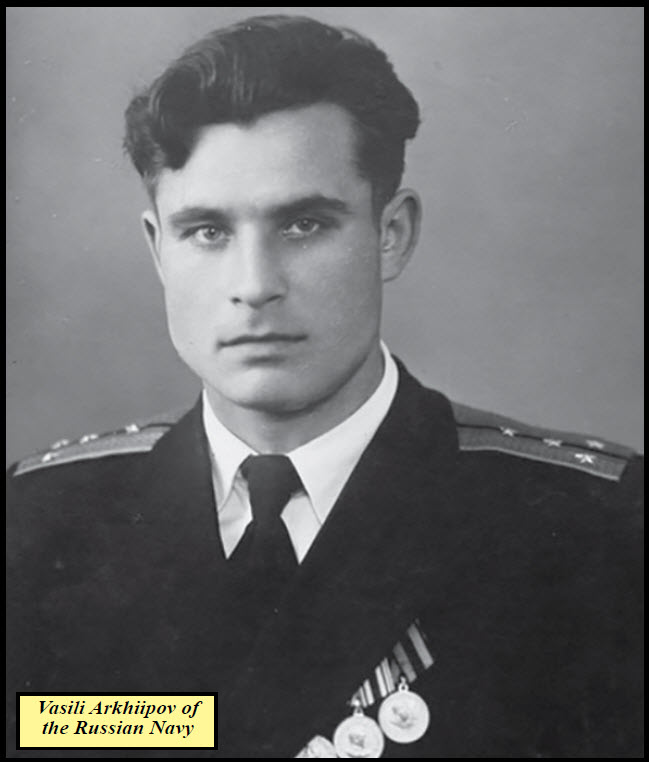Lessons From “The Man Who Saved The World”
By: Mae Lewis
On October 27, 1962, during the Cuban Missile Crisis, the world came dangerously close to World War III.
A Russian submarine had become cornered near Cuba by the American naval blockade. For days, the submarine had been submerged, and the crew was being subjected to low oxygen, increasing temperatures, and electrical malfunctions. They had been unable to communicate with Moscow due to their location, and the strain of their situation was taking a toll.
The Americans knew the Soviet sub was beneath them, and had been dropping depth charges around the sub trying to get them to surface, not realizing that they were contributing to an already overheated situation.
The Americans had been in communication with Moscow, but they were unaware that the sub was outfitted with a nuclear weapon AND the pre-authorization to launch the weapon at their discretion.

Inside the metal tube of the submarine, the depth charges made it feel as though they were being attacked. The Captain, wrongfully believing that the war had already begun, panicked, and made the decision to launch the weapon. The decision required the approval of two other officers. One of the men said yes. The other – a man named Vasili Arkhipov – said no.
Arkhipov’s experience told him that the Americans were only dropping depth charges. In a very calm way, he was able to convince the captain and the other officer that this was not an attack, and that they should surface and not release the weapon.
It took about four hours of convincing, but eventually Arkhipov’s cool temperament won the day. The sub surfaced, was peacefully greeted by the Americans, and then returned to Moscow, where Arkhipov was named a hero. Over the years, he has been named a hero many times over. It has been said that “no other person has ever made a more valuable contribution to humanity than he did.” (Max Tegmark of the Future of Life Institute).
Some have said it was Arkhipov’s luck that avoided a nuclear catastrophe that day, but character is a guiding force for “luck.” There are two qualities that Arkhipov possessed that made him a hero:
First, he didn’t lose sight of the big picture (vision). Yes, it was a hot (122 degrees F), stressful, uncomfortable situation. The crew was tense and anxious. His ability to see beyond his present discomfort and to consider future consequences should not be taken lightly. His decisions indicate that he considered the ramifications on a global scale. He displayed qualities of someone who is inherently unselfish and willing to make the necessary sacrifices for the good of humanity.
Secondly, he wasn’t afraid to say no (courage). The captain believed that the Soviet Navy was being disgraced, and that the launching of the nuclear weapon would not only bring them victory, but honor. Arkhipov was not only risking his military career (what if he was wrong?), but the honor of his country, and the respect of his commanding officers. In the pressure of the moment, it would not have been an easy thing to be the one person who was standing against the captain, yet you and I are here today because he did.
I have most certainly never been faced with a “nuclear level” decision, thank God! But I have had many times in my life where I have wished that I had said no and not given in to peer pressure –the times where I wish I had considered the consequences both to myself and to those around me. I have not always managed to keep my cool when circumstances are against me, and my imagination has gotten the better of me and led me to make a panicked decision. Being a hero requires making the right decisions, even in the smallest of moments.
Vasili Arkhiipov had vision and courage, both of which combined into “a lucky moment” in human history. In this very heated political climate, I hope we will all take a lesson from him and consider the consequences of our actions, not just what will relieve the pain at the present moment. Firing a weapon is easy. Don’t take the easy way out. Let’s have the hard conversations, not just jump at the chance to press a button and eliminate the problem. As we navigate the nervous energy of our peers and politicians, don’t respond with anger and “fuel for the fire!” Keep the big picture in mind and keep a clear head. You may be the next hero for future generations.
By: Mae Lewis